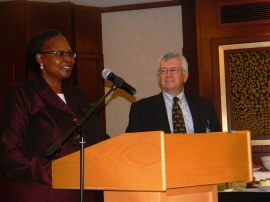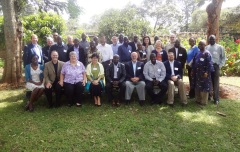A consultation on Emerging Patterns of Christian Identity in Urban East Africa.
July18-21st, Nairobi, Kenya.
By Wanjiru M. Gitau
Given Christianity’s shift southwards, world Christianity has entered an era of expansion and staggering diversity. The venerable Andrew Walls refers to this as the “Ephesians Moment”. CWC exists to recognize, announce and extend the Ephesians moment by among other means, networking and partnering with centers that promote the study of World Christianity. We have a significant partnership with the Center for the Study of World Christian Revitalization Movements at Asbury Theological Seminary. In October 2012, we entered into dialogue about holding a consultation on Christian revitalization in urban East Africa. The consultation included several phases.
Case Studies: At the start of the year, a call for papers was sent to identified researchers to write the stories of five Christian movements around East Africa. These were:
- George Atido, a PhD candidate at AIU wrote a case on the Living Stone Movement Bunia, DRC.
- On contingency, Atido wrote a second paper on the vision and mission of Bunia Theological Seminary.
- Rev David Omona wrote a case on The Ministry of All Saints Cathedral in Kampala, Uganda.
- Maggie Gitau, also a PhD candidate wrote a case on Mavuno Church in Nairobi.
- Daniel Karanu wrote on Fellowship of Christian Unions (FOCUS), Nairobi.

Philomena Mwaura addressing the May 27th Luncheon gathering. Mark Shaw in background
Introducing CWC to local Christian leaders: On May 27th 2013, we assembled 22 local pastors, theologians and parachurch leaders for a luncheon at the Serena Hotel. We shared the vision of CWC—to network, empower and resource the ongoing work of the Holy Spirit in this context. Professor Philomena Mwaura of Kenyatta university gave a keynote address on emerging patterns of Christian revitalization in Kenya. Guests were then invited to return to Serena on 21st July to continue the conversation.
THE CONSULTATION, 18-21st JULY
After many months of joint planning with the team from Asbury, we brought together 35 international and local guests at the Ressurection Garden retreat center for a two day colloquium. The Asbury team was led by Jim Miller, professor of New Testament Theology at Asbury Theological Seminary. Jim has lived and taught in Kenya for many years. We’ll have feature on him in this blog.
Opening lecture: The eminent Paul Gifford, Professor Emeritus of the Center for Oriental and African Studies at the University of London gave the opening address. Gifford who has researched and written extensively on Christianity in Africa, focused his address on what he calls the “enchanted religious imagination” that pervades much of African Christianity. According to him the engagement with the primal spiritual worldview is the greatest reason for the explosion of Christianity in Africa. He lamented that though pervasive, this reality is not given the attention it deserves in discussions of Christianity in Africa. His talk attracted a vigorous rejoinder from floor as participants both affirmed and refuted his claims on Christian activity in Africa. That address was a good a note as any to start the consultation on a realistic ground of awareness of the dynamism and diversity within Christianity in Africa. Watch this space for a feature on professor Gifford.
Table discussions: The heart of the consultation consisted two days of intensive discussions around small table groups. Professor Orobator, a priest with Jesuits East Africa gave an induction to the pastoral circle method that was used to analyse each case. At its heart, the pastoral circle is an intentional approach to explore “a word too large for any one person’s mouth”. Though the concept has roots in a different theological context, it resonates with the African palaver (Baraza in Swahili). A palaver is led by a council of elders, where the community sits under a tree to listen, to discover, to deliberate and through that process generate communal solutions to issues among them. As a theological tool, the circle takes social location, culture and change processes seriously. It identifies what is happening, assesses why it was happening, confronts the activity through the lenses of scripture and finally seeks to empower that activity with recommendations out of the process. And that is what the table groups sought to do with each of the cases. Each table handled one of the five cases. A group consisted of the case writer, two activists from the case, and international, interdisciplinary scholars. Based on these discussion, the cases will be revised for possible publication to make them more widely available.
Sharing with local Christian leaders: The final piece of the consultation was a gathering of local pastors and scholars that we had invited to a luncheon earlier. We brought them in for high tea with consultation participants at Serena Hotel in the city. We shared some of the case study findings so to strengthen local ministries and encourage them to learn from each other.

Consultation Group
We came away from the consultation humbled by the realization that the work of the Holy Spirit in urban East Africa is even greater than the famous East African Revival. It is not the initiative of any one person or a select few. The current move of the Holy Spirit is far more expansive, involves larger segments of the population, includes older churches as well as newer movements. Even though most of the movements and all the christian activity has a lot of room for growth, we believe that this revitalization will have far reaching effect in East Africa, particularly as it opens new possibilities of engagement with the public space.
In coming weeks we will post some personal perspectives from some participants at the consultation. A number of collaborative projects among the participants will also be forthcoming in the months and years ahead. Watch this space.
0 Responses to ““New Cities and New Jerusalems”: Emerging Patterns of Christian Identity in Urban East Africa”